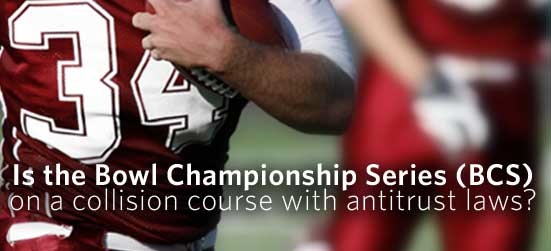Do Football Bowl Games Break Antitrust Law?
Yes, alum expert will say at LAW talk tomorrow

College football’s popular Bowl Championship Series (BCS) won’t come again for almost a year, but meanwhile its embattled officials face continuing questions about whether they’re running an illegal monopoly. Antitrust lawyer Paul M. Kaplan explains why he thinks the answer is yes in a talk at the School of Law tomorrow.
Kaplan (CAS’73), a partner with the New York firm Alston & Bird, testified against the BCS—which oversees the fabled Rose Bowl and four other bowl battles—before the U.S. Senate Judiciary Committee in 2009.
The BCS runs a 13-year-old five-game series that claims to pit the top two college football teams in a nationally televised championship. (Auburn defeated Oregon in last month’s showdown.) The champions from six football conferences get automatic slots in the series. Critics say that’s unfair and violates antitrust law. The New York Times reports one example: in 2008, the University of Utah went undefeated on the field, including in one BCS bowl game, but was ineligible to play in the BCS championship because it was not a member of the half-dozen eligible conferences.
Kaplan says he got involved in the issue after a former client asked him to research it several years ago. “I’m not really much of a college football fan,” he says, but “I looked at it and felt that it was a pretty bad example of a cartel. They limit the number of games that are played. They limit who gets to play whom, not based on on-field performance.” Kaplan would like to see the system replaced with a national playoff series similar to basketball’s NCAA tournament, in which every conference in Division 1 (the NCAA’s highest level) automatically qualifies.
“Look at March Madness,” he says. “Look at how exciting that is. I recognize the differences between the sports, but you could have that same kind of excitement and true competition.”
For its part, the BCS says that “all 11 conferences competed fairly for an opportunity to earn automatic qualification status” and had agreed to the methodology for determining that. In an interview with the Arizona Republic, BCS executive director Bill Hancock (a former director of the NCAA men’s basketball tournament) argued that an NCAA-style system would inevitably suffer from the same “bracket creep” he says plagues the basketball tournament, devaluing the contest. Kaplan says the BCS has also argued that it’s a type of organization that legally is protected against antitrust claims by stringent proof standards.
“It’s a fascinating problem he’s tackling,” says CAS Dean Virginia Sapiro, who organized the talk. “College football is so popular nationally, but many people don’t realize what a big business it is and what difference that business structure makes. I’m very pleased that we’re able to bring back one of our great CAS alumni to share with us his great knowledge and insights.”
Kaplan, a member of BU’s Alumni Council, earned his law degree at Northeastern University. His first job was as an associate at a London law firm, after which he clerked for the Massachusetts Supreme Judicial Court. His extensive antitrust work includes a stint as a lawyer for AT&T during its court-ordered reorganization after being found in violation of antitrust laws.
Kaplan has taught advanced antitrust law as an adjunct professor at Fordham Law School for two decades. He serves on the board of the America-Israel Friendship League and organized a financial services delegation to Israel five years ago. He is a member of both the New York and Massachusetts bars.
If the BCS debate seems like a collision between sports fans, the 2009 Senate hearing indicated that it has caught lawmakers’ attention as well. Kaplan says Utah’s attorney general and the federal Justice Department are reviewing the matter. As for him, “I am working with some states on this issue. That’s really all I can say at this point.”
No less a public official than President Obama has endorsed replacing the BCS system with a national championship playoff. But with recession, wars, and more imminent crises to contend with, some say he has taken his eye off this particular ball.
The Bowl Championship Series (BCS): Is It Fair and in Compliance with the Antitrust Laws? A Lecture and Discussion with Paul M. Kaplan runs from 1 to 2:15 p.m., Tuesday, February 8, at LAW’s Barristers Hall, 765 Commonwealth Ave.; it is free and open to the pulic. The talk is sponsored by the College of Arts & Sciences, the School of Law, the BU Law Communication, Entertainment and Sports Law Association, and the School of Management’s markets, public policy, and law department.
Rich Barlow can be reached at barlowr@bu.edu.
Comments & Discussion
Boston University moderates comments to facilitate an informed, substantive, civil conversation. Abusive, profane, self-promotional, misleading, incoherent or off-topic comments will be rejected. Moderators are staffed during regular business hours (EST) and can only accept comments written in English. Statistics or facts must include a citation or a link to the citation.